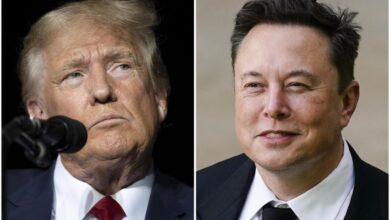
Elon Musk Threatens Transatlantic Rift
Elon Musk threatens to widen the rift between Europe and America – a bold statement, but one increasingly supported by his actions and pronouncements. This isn’t just about tweets; it’s about the potential fracturing of crucial economic and technological partnerships across the Atlantic. We’re looking at the impact of Musk’s decisions on everything from electric vehicle markets to space exploration, and the very real possibility of a new geopolitical divide.
This post delves into the specifics, exploring the ramifications and examining the narratives surrounding this potentially explosive situation.
Musk’s outspoken nature and his influence on multiple key industries mean his actions have far-reaching consequences. His comments regarding European regulations, his business decisions affecting both continents, and even his role in the public sphere contribute to a growing sense of division. We’ll examine specific examples, analyzing reactions from governments and businesses on both sides of the Atlantic to see just how real this threat might be.
We’ll also consider the potential for mediation and strategies to mitigate the damage.
Public Opinion and Media Coverage: Elon Musk Threatens To Widen The Rift Between Europe And America

Elon Musk’s pronouncements and actions have ignited a complex and multifaceted reaction across the Atlantic, prompting a wide range of opinions and generating significant media attention. Understanding the nuances of public sentiment and media portrayals is crucial to comprehending the potential for a lasting rift between Europe and America.
Public Reactions in Europe and America
Public reaction to Musk’s statements has been far from uniform. In the United States, opinions are largely divided along existing political lines. Supporters often view his outspokenness as refreshing and authentic, while critics see it as reckless and damaging to international relations. A significant portion of the American public, however, remains largely indifferent or uninformed about the specifics of his comments.
The situation is somewhat different in Europe. While there is certainly a segment of the population that appreciates Musk’s entrepreneurial spirit, a more pronounced critical response exists, particularly among those concerned about the potential for increased transatlantic tension and the impact on European interests. Many European commentators have expressed concerns about Musk’s influence and the potential for his actions to undermine multilateral cooperation.
This skepticism is fueled, in part, by concerns about the potential for American unilateralism and a perceived disregard for European perspectives.
Media Coverage Comparison
American media coverage has been characterized by a wider spectrum of viewpoints, ranging from enthusiastic support to harsh criticism. Right-leaning outlets have generally been more sympathetic to Musk, while left-leaning outlets have tended to be more critical. The tone often reflects existing political divisions, with less emphasis on the potential impact on transatlantic relations. European media coverage, conversely, has shown a more unified tendency towards critical analysis.
Major European news outlets have frequently highlighted the potential for Musk’s actions to exacerbate existing tensions and damage international cooperation. The emphasis is often on the implications for European security and economic interests, with less focus on internal American political dynamics.
Media Framing and the Widening Rift, Elon musk threatens to widen the rift between europe and america
The framing of Musk’s actions in the media plays a significant role in shaping public perception and potentially contributing to or mitigating the widening rift. Negative framing, particularly in European media, emphasizing the potential for damage to transatlantic relations, risks fueling further division. Conversely, more neutral or balanced coverage, acknowledging both positive and negative aspects of Musk’s actions, could help to de-escalate tensions.
The way in which Musk’s statements are contextualized – for example, as part of a broader trend of rising nationalism or as isolated incidents – significantly influences the interpretation and subsequent public reaction.
Visual Representation of Public Opinion
A hypothetical visual representation of public opinion could be a dual-bar chart, one for Europe and one for America. Each bar would be segmented to represent different levels of agreement with the statement: “Elon Musk’s actions are damaging to transatlantic relations.” The segments could represent “Strongly Agree,” “Agree,” “Neutral,” “Disagree,” and “Strongly Disagree.” The data for this chart would be hypothetical, requiring a large-scale public opinion poll in both Europe and America.
The methodology would involve randomly sampling representative populations in both regions, using standardized questionnaires and statistical analysis to ensure accuracy and reliability. For example, the chart might show a larger proportion of “Agree” and “Strongly Agree” responses in Europe compared to America, reflecting the difference in public perception. The chart’s title would clearly state the methodology and limitations of the data (e.g., “Hypothetical Public Opinion on Elon Musk’s Influence – Based on Hypothetical Survey Data”).
The data sources would be clearly identified as hypothetical survey data, pending the execution of such a survey.
Economic and Technological Ramifications

Elon Musk’s actions, particularly his pronouncements and business decisions, carry significant weight in the global economic and technological landscape. His influence on specific sectors, from automotive manufacturing to space exploration, has the potential to reshape the competitive dynamics between Europe and the United States, fostering both cooperation and conflict. Analyzing these ramifications requires a nuanced understanding of the interconnectedness of these sectors and the strategic responses of businesses on both sides of the Atlantic.
Automotive Industry Impacts
Musk’s Tesla has already significantly disrupted the automotive industry globally. His influence could further exacerbate existing tensions or create new opportunities depending on policy responses and corporate strategies. For example, a potential trade war spurred by Musk’s actions could negatively impact European automakers relying on US markets, while simultaneously boosting domestic US production. Conversely, increased competition could drive innovation and efficiency across the board.
The European Union’s focus on electric vehicle (EV) development might find itself either collaborating with or competing against Tesla’s technological advancements, depending on the specifics of future policies and market dynamics.
Aerospace Sector Implications
SpaceX, under Musk’s leadership, is a major player in the commercial space industry. Its success could lead to both cooperation and competition with European space agencies like ESA. While collaborations on certain projects remain possible, SpaceX’s ambitions and technological advancements also present a competitive challenge to European efforts in satellite launches and space exploration. This competition could spur innovation but also raise concerns about market dominance and potential geopolitical implications.
For instance, a scenario where SpaceX secures a disproportionate share of the launch market could leave European companies struggling to compete.
Technology Sector Disruptions
Musk’s influence extends beyond automobiles and aerospace. His involvement in artificial intelligence (AI) through companies like Neuralink and xAI, along with his outspoken views on the technology, could significantly impact the AI landscape. A potential scenario involves a technology race between the US and Europe, with each side vying for AI dominance. This could lead to increased investment in research and development but also raise concerns about ethical considerations and regulatory frameworks.
Furthermore, his pronouncements on AI safety and governance could influence policy decisions on both continents, potentially leading to either harmonized or divergent regulatory approaches.
Strategies for Navigating Challenges
The potential for both conflict and cooperation necessitates proactive strategies from European and American businesses. The following are some potential approaches:
Navigating the complex landscape created by Musk’s actions requires careful consideration of several key factors. The potential for both heightened competition and unexpected collaborations demands a strategic and adaptable approach.
- Invest in R&D and Innovation: Increased investment in research and development across all relevant sectors is crucial to maintain competitiveness and respond to technological advancements driven by Musk’s companies.
- Foster Public-Private Partnerships: Collaboration between governments and businesses can facilitate strategic investments in key technologies and ensure national competitiveness.
- Develop Robust Regulatory Frameworks: Clear and effective regulations are necessary to address the ethical and societal implications of emerging technologies while promoting innovation.
- Promote International Collaboration: Despite the potential for competition, cooperation on certain projects and initiatives can yield mutual benefits and foster technological advancement.
- Diversify Supply Chains: Reducing reliance on single suppliers, including those associated with Musk’s companies, can mitigate risks and ensure business continuity.
The question isn’t just
-if* Elon Musk’s actions are widening the transatlantic rift, but
-how* we can prevent further escalation. While his influence is undeniable, the future isn’t predetermined. Understanding the diverse reactions, the economic implications, and the potential for both conflict and cooperation is crucial. Ultimately, navigating this complex situation requires careful consideration of the geopolitical landscape and proactive strategies from both European and American stakeholders.
The coming years will be pivotal in determining whether this threat becomes a reality or remains a potential flashpoint.
Elon Musk’s recent actions are definitely causing a stir, potentially driving a deeper wedge between Europe and America. His controversial Twitter pronouncements have added fuel to the fire, and it’s fascinating to see how others are reacting; for instance, check out Trump’s response to the whole situation in this article: trump responds to elon musks twitter revelation.
Ultimately, Musk’s behavior continues to fuel this growing transatlantic tension, leaving many wondering what will happen next.
Elon Musk’s recent actions are causing a lot of friction between Europe and America, raising concerns about transatlantic relations. It feels like we’re facing a perfect storm of geopolitical issues, and to understand the bigger picture, you really need to check out this incredible analysis: analysis buffet 25 urgent things you need to know about spygate epstein china financial collapse mass shootings and civil war.
The insights offered there really help contextualize Musk’s actions within a broader landscape of global instability, making his potential contribution to the widening rift even more concerning.
Elon Musk’s recent actions are definitely escalating tensions between Europe and America, creating a whole new level of geopolitical uncertainty. It’s hard to ignore the domestic drama playing out, too; the ongoing fallout from Biden’s response to Trump’s declassification order claims, as reported here: biden responds to trumps declassification order claims , only adds to the existing friction.
All this political turmoil makes Musk’s threats seem even more impactful, potentially deepening the transatlantic divide further.






